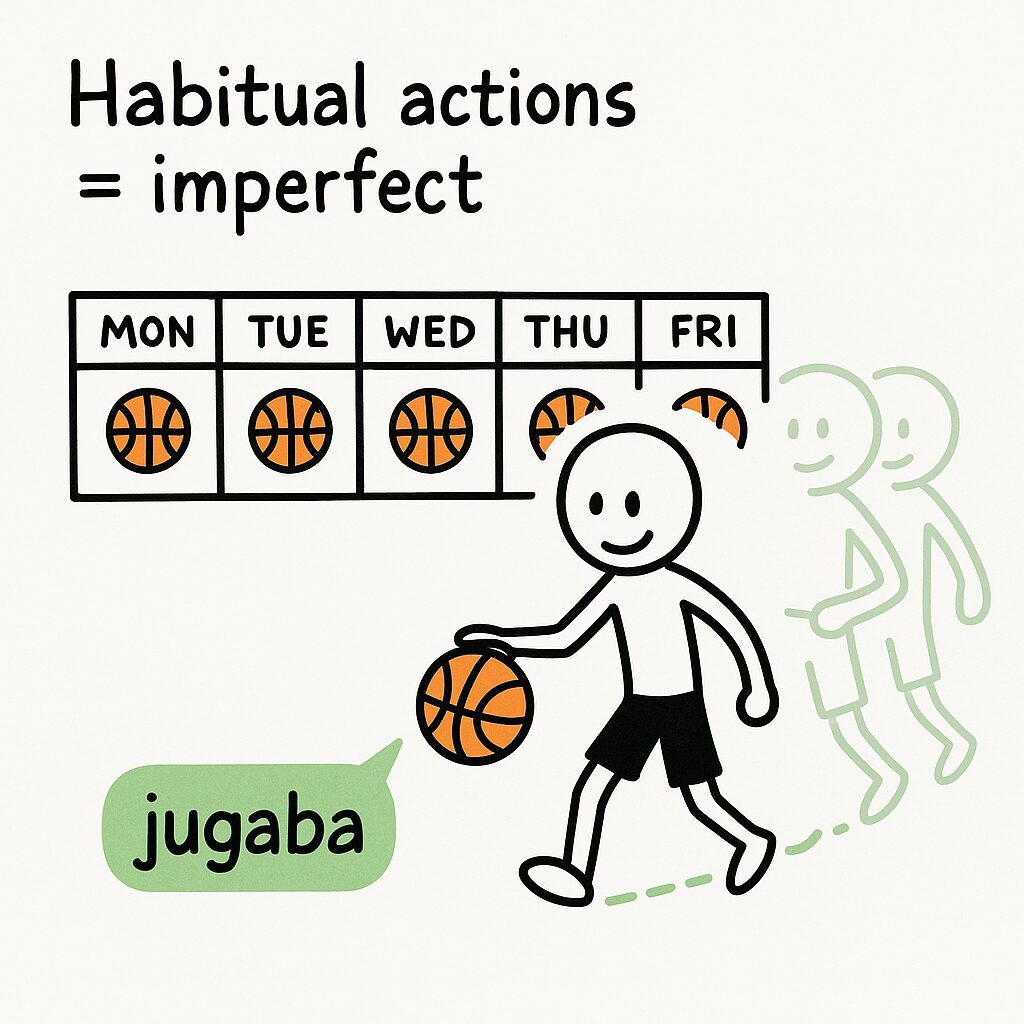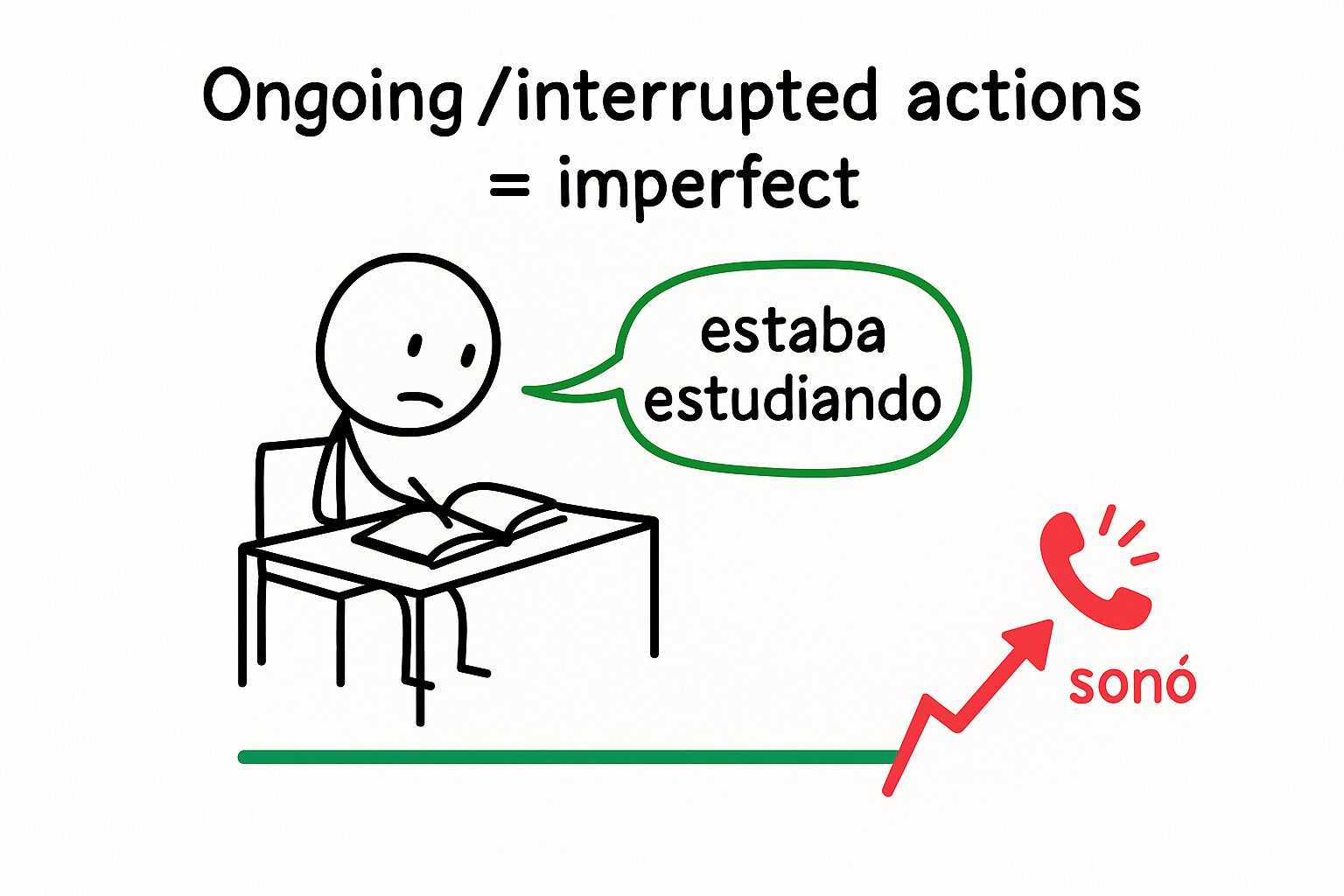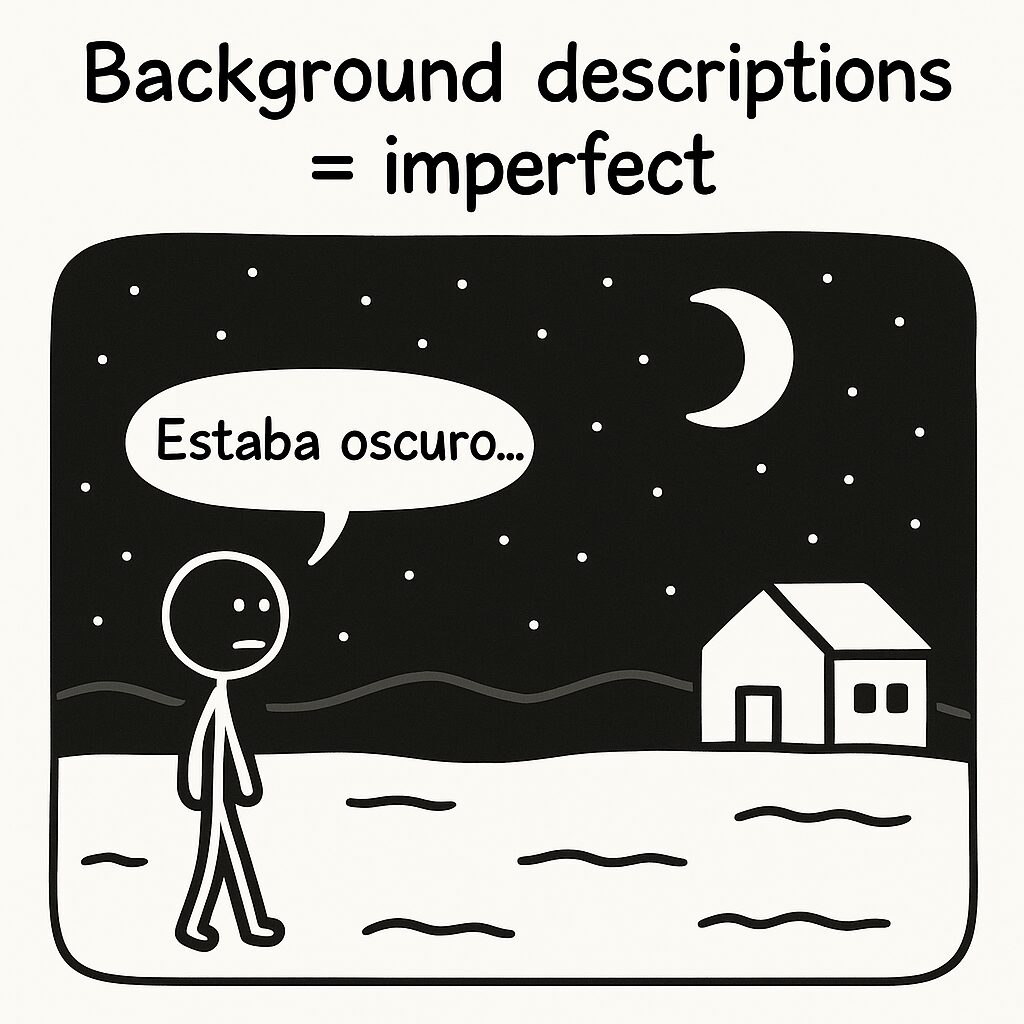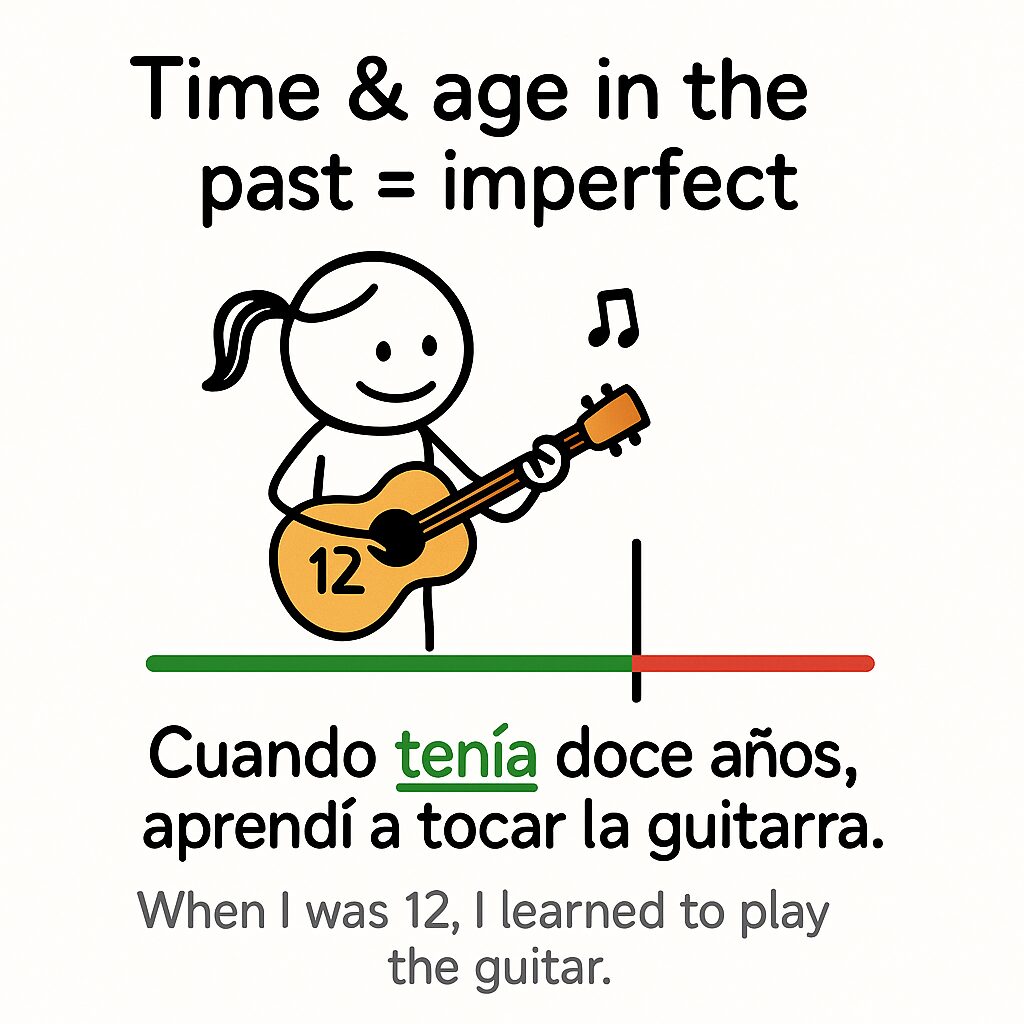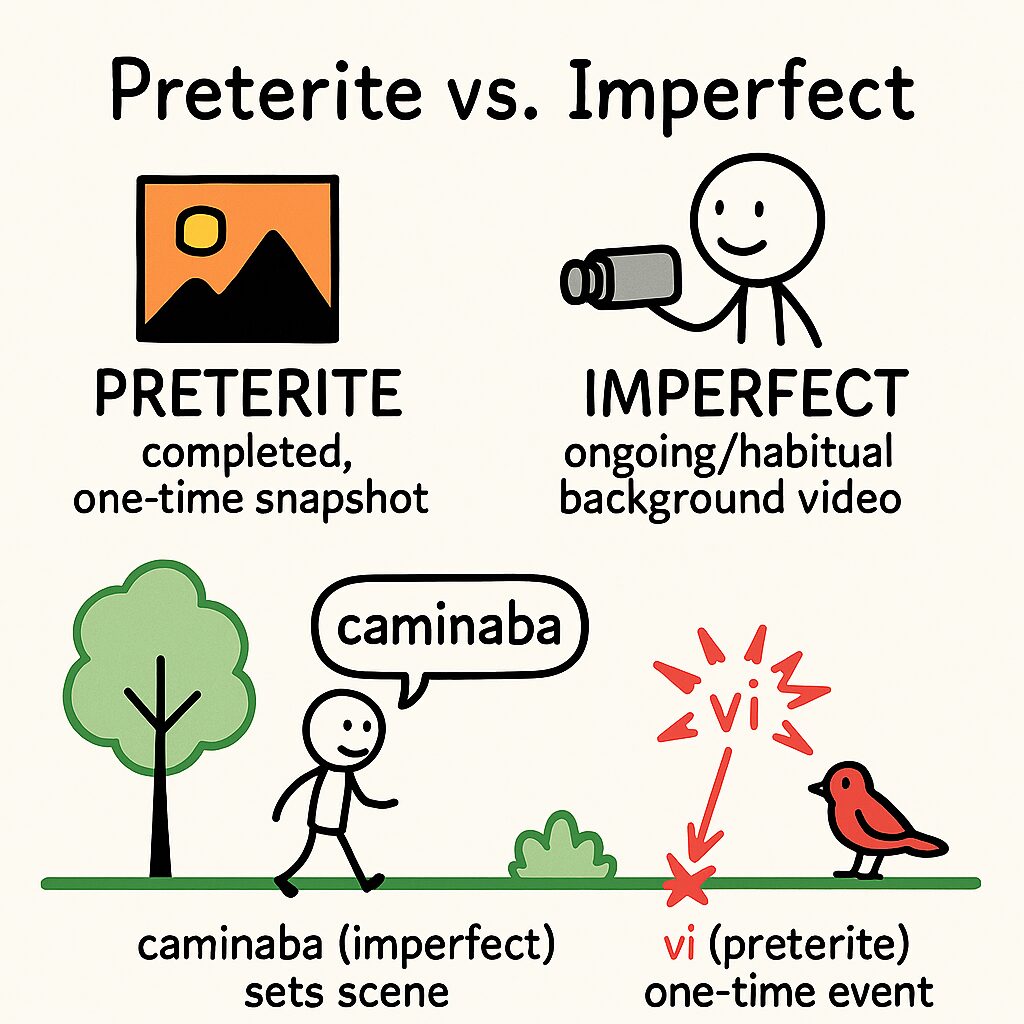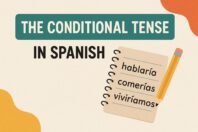What is The Imperfect Tense in Spanish? A Beginner-Friendly Guide
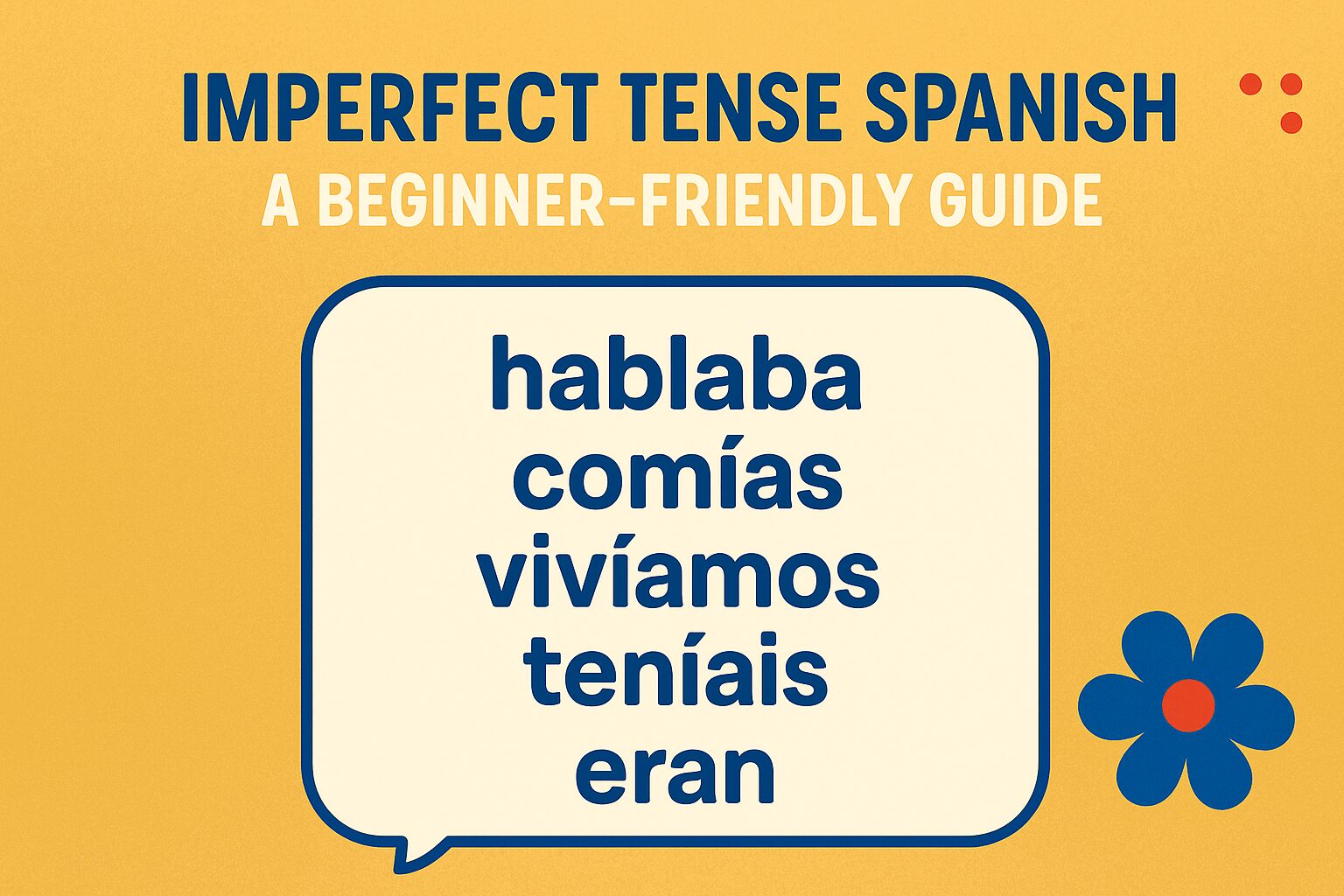
Get our free email course, Shortcut to Conversational.
Have conversations faster, understand people when they speak fast, and other tested tips to learn faster.
More infoThe imperfect tense in Spanish (pretérito imperfecto) is one of the most accessible verb tenses you’ll encounter. You can think of the imperfect as your tool for expressing the past in a more nuanced way. In this beginner-friendly guide, we’ll explore what the Spanish imperfect tense is, when to use it, how to conjugate it (including the few irregulars), and how it differs from the preterite. You’ll also see plenty of examples of the imperfect tense in Spanish with English translations, plus some tips to avoid common mistakes. ¡Vamos!
What is the imperfect tense in Spanish?
The Spanish imperfect tense is used to describe past actions that were ongoing, habitual, repeated, or not clearly completed.
In simpler terms, if you want to talk about things you “used to do” or “was/were doing” in the past, you’ll likely use the imperfect tense.
For example, “Cuando era niño, jugaba al baloncesto todos los sábados.” (When I was a child, I used to play basket every Saturday.)
Why is it called “imperfect tense”?
The name comes from the idea of an unfinished or ongoing past action, something that wasn’t a one-time event.
The imperfect tense describes the background or setting in the past, instead of indicating a specific finished action.
When do you use the imperfect tense in Spanish?
In Spanish, the imperfect is used in several common past situations:
Habitual or repeated actions (“used to …”)
The imperfect tense is perfect for talking about past routines or habits: things you used to do regularly, possibly without even thinking about them. Any time you want to say “used to ___” in English, Spanish almost always reaches for the imperfect.
| Spanish | English |
| De niño, jugaba al baloncesto todos los días. | As a child, I used to play basketball every day. |
| Mi abuela cocinaba arroz todos los domingos. | My grandma used to cook rice every Sunday. |
| Nosotros íbamos al parque cada tarde después de la escuela. | We used to go to the park every afternoon after school. |
Ongoing/interrupted actions (“was … ing”)
When an action was in progress in the past, sometimes interrupted by another event, you’ll use the imperfect for the background action. The “interrupter” (the thing that suddenly happened) usually appears in the preterite.
| Spanish | English |
| Estaba estudiando cuando sonó el teléfono. | I was studying when the phone rang. |
| Ella leía un libro mientras yo preparaba el café. | She was reading a book while I was making coffee. |
| Caminábamos por la playa cuando empezó a llover. | We were walking on the beach when it started to rain. |
Background and scene-setting (descriptions)
Think of the imperfect tense as your storytelling paintbrush. Use it to describe weather, scenery, emotions, physical traits, anything that sets the stage in the past rather than pushes the plot forward.
| Spanish | English |
| La noche estaba oscura y hacía frío. | The night was dark, and it was cold. |
| La casa era blanca y tenía ventanas azules. | The house was white and had blue windows. |
| El mercado olía a pan fresco y todos parecían felices. | The market smelled of fresh bread, and everyone seemed happy. |
Time and age in the past
Whenever you mention what time it was or how old someone was, Spanish defaults to the imperfect. Use ser to tell time and tener to state age. No exceptions here!
| Spanish | English |
| Eran las ocho de la noche. | It was 8 PM. |
| Era medianoche y la ciudad estaba en silencio. | It was midnight, and the city was silent. |
| Cuando tenía doce años, aprendí a tocar la guitarra. | When I was twelve, I learned to play the guitar. |
How to conjugate the imperfect tense (regular & irregular verbs)
Luckily, conjugating verbs in the Spanish imperfect tense is straightforward. There are only two sets of endings for regular verbs, and just three irregular verbs in total (to make things more fun).
Regular verb conjugations
For any regular verb, take off the infinitive ending (-ar, -er, -ir) and add the imperfect endings. The endings for -ar verbs are different from those for -er and -ir verbs:
- -AR verbs: -aba, -abas, -aba, -ábamos, -abais, -aban
- Example: hablar (to speak) → yo hablaba, tú hablabas, él/ella hablaba, nosotros hablábamos, vosotros hablabais, ellos/ustedes hablaban.
- -ER / -IR verbs: -ía, -ías, -ía, -íamos, -íais, -ían
- Example: comer (to eat) → yo comía, tú comías, él/ella comía, nosotros comíamos, vosotros comíais, ellos/ustedes comían.
- Example: vivir (to live) → yo vivía, tú vivías, él/ella vivía, nosotros vivíamos, vosotros vivíais, ellos/ustedes vivían.
🌎 Note: In Spain, the informal second-person plural pronoun vosotros/vosotras (with endings like -abais, –íais) is standard. Throughout Latin America, speakers almost always use ustedes for both formal and informal context, and it conjugates just like the third-person plural (-aban, -ían).
- Spain: vosotros hablabais
- Latin America: ustedes hablaban
Irregular verbs
The imperfect tense has only three irregular verbs, and you just have to memorize these. They are ir (“to go”), ser (“to be”), and ver (“to see/watch”):
| Subject pronoun | ir | ser | ver |
| yo | iba | era | veía |
| tú | ibas | eras | veías |
| él / ella / usted | iba | era | veía |
| nosotros / nosotras | íbamos | éramos | veíamos |
| vosotros / vosotras | ibais | erais | veíais |
| ellos / ellas / ustedes | iban | eran | veían |
How is the imperfect tense different from the preterite?
The preterite is used for completed past events (think of it as a snapshot of a one-time moment), while the imperfect is used for ongoing, habitual, or background actions (like a continuous video or backdrop).
Often, the imperfect provides the background context, and the preterite describes the specific events that occurred against that background.
For example, “Caminaba por el parque cuando vi un pájaro rojo.” translates to “I was walking through the park when I saw a red bird.” Here, caminaba (“was walking”) sets the scene with the imperfect, and vi (“saw”) is the one-time event in the preterite.
The theory seems pretty straightforward, but you will need practice to master it (nothing new here). In addition, there are some common mistakes you need to avoid. We’ll see them next.
Practice tips & common mistakes to avoid
Below are a few extra tips that will save you from the most frequent slips with the imperfect.
| Tip / pitfall | Why it matters | Quick fix + example |
| Time & age always use the imperfect | Learners sometimes default to the preterite (fue las ocho, tuve cinco años). Native speakers never do. | ✅ Eran las ocho cuando llegamos. (It was eight when we arrived.)
|
| Match markers & tenses | Words like ayer, anoche, el año pasado point to finished actions → preterite. Pairing them with the imperfect feels off. | ❌ Ayer estaba en la oficina todo el día.
|
| Don’t skip the accent marks | Missing the accent on í in -ía / íamos / íais or on é in éramos changes the meaning (or looks wrong). | ❌ Nosotros eramos
|
| Use imperfect for “used to want/think/feel” | Verbs that express mental or emotional states (querer, pensar, sentir, creer) typically stay imperfect when you describe how things were. | ✅ De niño, quería ser piloto. (As a kid, I wanted to be a pilot.)
|
| Combine imperfect + preterite for rich storytelling | Use the imperfect to set the scene and the preterite to move the action forward. | La fiesta fue increíble; todos bailaban y reían. |
| Remember the three irregulars | Everything else is regular, so mix-ups are obvious. | ir – iba, ibas… / ser – era, eras… / ver – veía, veías… |
Conclusion
To recap, use the imperfect tense in Spanish for past habits, ongoing or interrupted actions, and background details like time, age, and descriptions.
Keep practicing these examples of imperfect tense usage, and soon choosing between “hablaba” and “hablé” will become second nature.
You’ve got this!
Spanish Imperfect Practice
Now that you’ve gained a solid understanding of the imperfect tense in Spanish, it’s time to put your knowledge to the test! Conjugate the verbs in parentheses in the Spanish imperfect tense, being sure to choose the right conjugation to match the subject of the sentence. The answers and translations are below.
1. Mi mamá siempre ________ (olvidar) las llaves en el auto cuando salía de compras.
2. Claro, todos los veranos nosotros ________ (ir) allí de vacaciones.
3. No me ________ (sentir) muy bien en ese momento, así que llamé a mi mejor amigo.
4. En el colegio, los niños ________ (tener) clase de música los miércoles.
5. ________ (llover) mucho cuando salí de casa.
6. Tu siempre ________ (pagar) la cena cuando ________ (salir) con tus amigos.
7. ________ (ser) las tres de la tarde cuando Luis salió de casa.
8. Para ese entonces ________ (tener) ocho años, ya no recuerdo mucho.
9. Ustedes ________ (hacer) la cena mientras ellos ________ (limpiar) la casa.
10. Vosotras ________ (ser) muy delgadas en aquella época.
Answers
1. Mi mamá siempre olvidaba las llaves en el auto cuando salía de compras. – My mom would always forget her keys in the car when she went shopping.
2. Claro, todos los veranos nosotros íbamos allí de vacaciones. – Sure, every summer we would go there on vacation
3. No me sentía muy bien en ese momento, así que llamé a mi mejor amigo. – I wasn’t feeling very well at the time, so I called my best friend.
4. En el colegio, los niños tenían clase de música los miércoles. – At school, the kids had music class on Wednesdays.
5. Llovía mucho cuando salí de casa. – It was raining a lot when I left the house.
6. Tu siempre pagabas la cena cuando salíamos con tus amigos. – You always paid for dinner when we went out with your friends.
7. Eran las tres de la tarde cuando Luis salió de casa. – It was three o’clock in the afternoon when Luis left the house.
8. Para ese entonces tenía ocho años, ya no recuerdo mucho. – I was eight years old at the time, I don’t remember much anymore.
9. Ustedes hacían la cena mientras ellos limpiaban la casa. – You made dinner while they cleaned the house.
10. Vosotras erais muy delgadas en aquella época. – You girls were very thin at that time.
